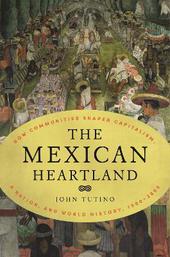
|
The Mexican Heartland: How Communities Shaped Capitalism, a Nation, and World History, 1500-2000
Paperback / softback
Main Details
| Title |
The Mexican Heartland: How Communities Shaped Capitalism, a Nation, and World History, 1500-2000
|
| Authors and Contributors |
By (author) John Tutino
|
| Physical Properties |
| Format:Paperback / softback | | Pages:512 | | Dimensions(mm): Height 235,Width 156 |
|
| Category/Genre | Development economics |
|---|
| ISBN/Barcode |
9780691227313
|
| Classifications | Dewey:972 |
|---|
| Audience | | Tertiary Education (US: College) | | Professional & Vocational | |
|---|
| Illustrations |
32 halftones. 17 tables. 17 maps.
|
|
Publishing Details |
| Publisher |
Princeton University Press
|
| Imprint |
Princeton University Press
|
| Publication Date |
25 January 2022 |
| Publication Country |
United States
|
Description
A major new history of capitalism from the perspective of the indigenous peoples of Mexico, who sustained and resisted it for centuries The Mexican Heartland provides a new history of capitalism from the perspective of the landed communities surrounding Mexico City. In a sweeping analytical narrative spanning the sixteenth century to today, John T
Author Biography
John Tutino is professor of history and international affairs and director of the Americas Initiative at Georgetown University. His books include Making a New World: Founding Capitalism in the Bajio and Spanish North America and From Insurrection to Revolution in Mexico: Social Bases of Agrarian Violence, 1750-1940 (Princeton).
Reviews"In this formidable work of scholarship, Georgetown University historian John Tutino recounts Mexico's long journey to modernity from the standpoint of small communities surrounding Mexico City. This ambitious exercise spans five centuries to analyze how these communities 'built, sustained, subsidized, resisted and changed capitalism' in its various phases from silver-based imperial capitalism under Spanish rule to the shift from national capitalism to liberal globalism in the late 20th century."---Jose Angel Gurria, Finance & Development "This longue-duree Braudelian study of Mexico draws from compelling and fascinating regional and local studies. . . . Based on the author's own original research as well as on broad scholarship from history, anthropology, sociology and political science in both English and Spanish that brings academic perspectives into dialogue beyond the conventional boundaries of disciplines and academic traditions."---Moramay Lopez-Alonso, EH.net "Combining economic and social history, Tutino explores the 500 year trajectory that saw central Mexico's transition from a major player in the world market even as the region remained largely autonomous from it to an economic afterthought buffeted by the hollowing out of the region by the neoliberal turn."---Andrae Marak, World History Connected "What Tutino has done is remarkable, working up and down the scales of analysis from villages to the world market, from gender relations of households to imperial policy."---Jeremy Adelman, American Historical Review "Tutino demonstrates the continued value and validity of an interpretation based on historical materialism. The book is an important contribution to the study of Mexico, globalization, and capitalism."---Robert W. Patch, Estudios Interdisciplinarios de America Latina y el Caribe
|